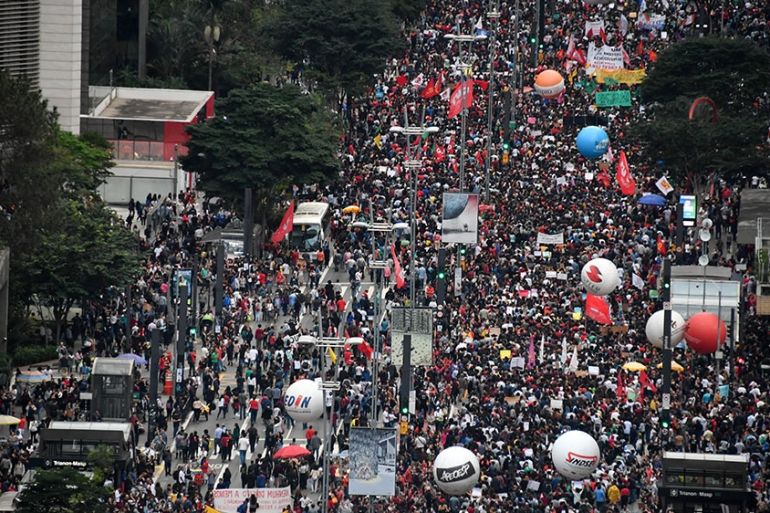Brazil: Teachers, students protest ‘scandalous cuts’ to education
Tens of thousands accuse President Jair Bolsonaro of using education as a political weapon to advance his agenda.

Sao Paulo, Brazil – Tens of thousands of students, teachers and researchers across Brazil took to the streets on Wednesday to protest against government cuts and spending freezes to the education budget.
Brazil’s National Student Union called for protests after the Ministry of Education said it was freezing nearly a quarter of discretionary spending due to budget restrictions across public services because of the current financial crisis in the country.
Keep reading
list of 4 itemsTen years after Chibok girls kidnapping: One woman’s struggle to move on
How Gaza is changing US campuses
Israel’s war is depriving Gaza’s students of an education
But scholars across Brazil accuse President Jair Bolsonaro of waging an ideological attack against education, and of using budget cuts to pressure congressmen to approve a much-anticipated but controversial pension reform.
“This protest is against what is happening at MEC,” said Celso Napolitano, president of the Federation of Teachers of Sao Paulo (FEPESP). “The cuts in federal universities mean a death strike in the scientific production in Brazil.”
Protests took place in 27 cities across the country. Online, the hashtag “education tsunami” trended throughout the day.
‘My weapon is my education’
In Sao Paulo thousands of protesters occupied the city centre for hours, chanting “Bolsonaro Out”, and holding signs reading “my weapon is my education”.
Marcus Vinicius, 19, was part of a large group of students from the University of Sao Paulo, one of the leading institutions in the country.
“The minister says we only party, then I want to invite him to come to our school and see what we produce every day,” Vinicius told Al Jazeera, referring to the Minister of Education’s statement that universities are in “shambles”.
Vinicius is studying public management and says his university has already made cuts to research, especially for post-graduates. “The ‘party’ we do is being here, protesting for education for our country, so that there is more inclusion, and people that really need public universities can have access to it,” he added.
![Tens of thousands protest changes to the country's education budget [Mia Alberti/Al Jazeera]](/wp-content/uploads/2019/05/3c72655a75c34b31adcba5b99aeadc4e_18.jpeg)
Just a few metres away, Letícia Coelho and other teachers looked on the protests and their students. A group dressed in blue protested in defence of the “survival of oceanography” courses, while others wearing black t-shirts rallied for law courses and departments.
“It touches me to see them here but it also makes me really sad that we still have to be fighting for education in 2019,” Coelho told Al Jazeera. She is an art history professor at the Federal University of Sao Paulo, and said many of her students come from lower classes and are the first generation of their families attending school.
“That makes it extra hard,” she said. “I think these cuts are scandalous and go against a long policy of investment in federal universities.”
‘Contingencies’
In a congressional hearing about MEC’s decision, Education Minister Abraham Weintraub said, “There are no cuts, only contingencies”.
He said the “contingencies” were part of a government austerity plan and that all funds could be reinstated “if the economy records any growth”. Opposition politicians accused Weintraub and the government of using budget cuts as “blackmail” to move their agenda forward.
In Brazil, the budget for universities is divided into mandatory expenses, such as salaries and pensions, which the government cannot reduce, and “discretionary” expenses, which includes water and electricity bills, housing for foreign students or maintenance work.
The recently announced cuts will slash 30 percent of funds to the discretionary expenses budget. This represents a cut of about $1.8bn, or 3.4 percent of the total annual budget for universities, according to MEC.
“The minister says the cuts only regard water and electricity bills, considered ‘non-mandatory’, but a university cannot run without water or light,” Napolitano said.
“Because those expenses have to be covered, and the council of deans have said this, they will have to end up cutting their financing for scientific research,” he added.
![People demonstrate during a strike organised by National Students Union in Sao Paul [Nelson Almeida/AFP]](/wp-content/uploads/2019/05/32a559c98f30428c86c3ca36b1360648_18.jpeg)
Funding for federal universities has been on a steady decline for years. A report by the news channel G1, using government data, revealed that more than 90 percent of all federal universities in Brazil have had their budgets reduced since 2013. The study found the decline in funding reached an average of 28 percent, although student enrolment went up 10 percent.
Investment in education has been a constant debate in Brazil, with pictures of schools with no light, holes in the roofs or cracks on the walls, constantly circulating on social media. For many, the announced budget cuts will deteriorate an already overwhelmed education system.
Bolsonaro and many of his ministers have criticised what they say goes on in public universities, often suggesting students use drugs and party instead of studying.
Earlier this month, during a Facebook Live broadcast, Bolsonaro said the money cut from federal universities will be reinvested in primary education, calling the education system in Brazil “a house with an excellent roof but rotten walls”.
As thousands took to the streets across the country, Bolsonaro arrived in Dallas, Texas, for an event.
Talking to reporters at the Dallas airport, Bolsonaro called those protesting “useful idiots and imbeciles” and that most were “militants with nothing in their hands”.
The government’s plan also includes freezing 3,500 post-graduate scholarships across the country, which represent an investment of $12.5m. A representative of MEC’s office for post-graduate studies (CAPES) told Al Jazeera the money “will not be re-invested somewhere else”, but that “if the economy recovers, the idea is that all scholarships are reinstated”. Until then, no new scholarships will be given.